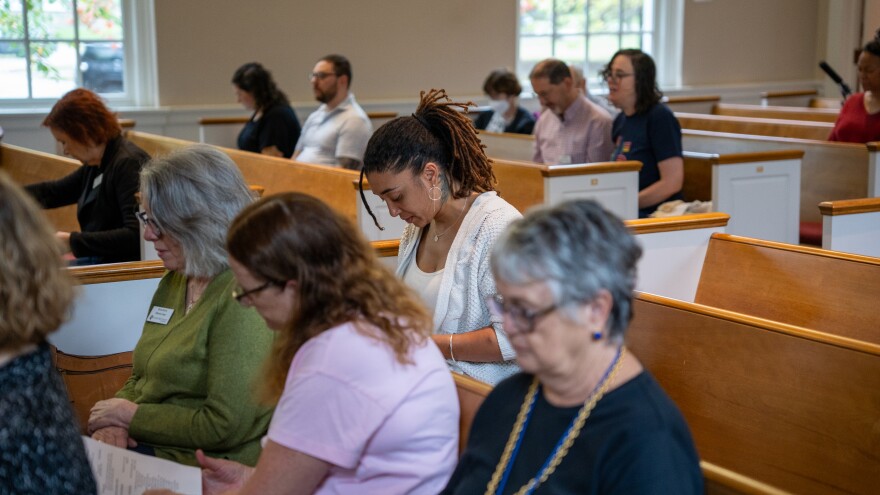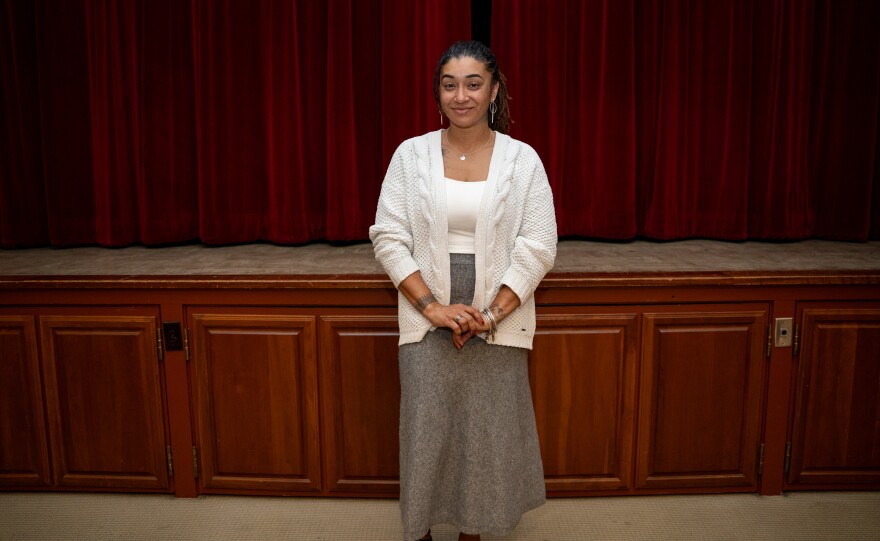It’s Sunday at Forest Hill Church, Presbyterian in Cleveland Heights, and service is just beginning.
Natasha Lovelace sits in the midst of the congregation at the end of a pew. She sings along to hymns, recites prayers, and she even brought cookies to share after service.
It’s a small show of gratitude for all she owes the church, Lovelace said.
"I'm just blessed that I was chosen to be a part of it," Lovelace said, referring to an award from the church’s Racial Repair and Restoration Taskforce to pay off $65,000 of her student loans.
"I ignored my loans; that's not okay," she said. "That's not a healthy way to address your finances, but unfortunately, I think it becomes like a fear. "
Student loan debt takes an average of 20 years to pay back. Data shows more than 40 million people in the U.S. carry some level of college debt, but the burden is bigger for Black women.
More than 63% of student loan debt in the U.S. belongs to women, according to the nonprofit Education Data Initiative, but Black women tend to have higher levels of debt after graduation and accumulate higher rates of interest during repayment, which makes paying off student loans more difficult.
Higher education hurdles
Lovelace is the first recipient of Forest Hill Church's Racial Education Debt Repair Award.
"When I sat down and looked [my loans] with Forest Hill, that was my first time in a few years. It was $120,000," Lovelace said. "It was just so disappointing because I only had one degree, so that $120,000 is just a representation of my struggle."
Lovelace's journey through higher education began in 2006 at Kent State University. Lovelace, an 18-year-old fashion design major and a single mother to her eldest daughter, struggled to find resources that would assist her in managing school, work and parenthood.
"Financially it was difficult, you know, because I still had to find child care for my daughter, gas, trying to get there," she said. "It was just too much."
She spent her first semester at Kent before enlisting in the Army due in large part to the college financial aid the military can provide. While the military did offset the cost, her service added another responsibility to her plate.
It took Lovelace eight years to graduate with her Bachelor's degree. Though it took her longer than she would liked, she said it was an essential experience that reflects her dedication to her education.
By 2019, Lovelace enrolled in an online masters program at the University of Phoenix. Classes went well at first, but when her daughter was shot in the head by a stray bullet that year, Lovelace said the support from the university dwindled.
"I was in the hospitals ... while she was in a coma doing my homework," Lovelace said. "I sent a letter to my professors, letting them know what happened, and one of my professors sent me back an email saying, 'well, you have four extra days to complete your work.'"
Lovelace dropped out of the program to focus on her daughter's recovery, but the loans she took out remained, until she discovered Forest Hill Presbyterian Church.
"All of the things that I've experienced, I also acknowledge is very unique to a black woman," she said. "For [the church] to see, like, okay, we are in this community and there's this specific problem with this specific group of people in this community, I think that's just amazing."

Faith and racial repair
Mark Chupp is one of six founding members of Forest Hill Presbyterian Church’s Racial Repair and Restoration Taskforce. The taskforce came together in 2022, Chupp said, to address a lack of equitable investment into Black communities.
"Racism has created winners and losers, and for people like myself, who I am a homeowner, I think it's a way to say I need to do something to take responsibility for the benefits I receive from racist policies and to make that racial repair," he said. "It's both a personal responsibility and responsibility of our congregation."
The Racial Education Debt Repair Award given to Lovelace will allow her to build wealth and reinvest that money elsewhere, Chupp said.
"Racial repair is important because of redlining and the way in which systematic denial of opportunities for wealth creation for people of color, especially women of color has been so dramatic in this country," he said. "Eliminating one person's college debt at a time is a way to say, now you can replace that student loan payment with a mortgage payment."
The Presbyterian Church (U.S.A.) established its Center for the Repair of Historical Harms three years ago. The church, which is nearly 95% white, contributed to systemic racial oppression for decades, the center's director Jermaine Ross-Allam said, including colonization, segregation and the suppression of Black, Latino and indigenous cultural practices.
"The Center for Repair had to pledge that we would return to that context to get a broader understanding of the depth and the breadth of colonial activities from the Presbyterian Church and to better understand by revisiting that context what our activity had cost people who are alive today," Ross-Allam said.
This oppression has lasting repercussions, Ross-Allam said, seen most apparently in a lack of access to financial resources.
"We are working in multiple ways to engage with congregations of color to understand to what extent have they been subjected to inadequate and inequitable access to the funds necessary to allow their ministries to flourish," he said, "and help become a blessing to the communities that surround them."
Other Presbyterian churches around the country have taken steps toward addressing this harm, including a congregation in Bloomington, Minnesota with an economic justice initiative that raised nearly $1 million to address a racial wealth gap and a Reparative Justice Fund established by The Presbytery of Baltimore in September.
Funds like these aren't charity, Ross-Allam said; they are debts owed to marginalized communities victimized by the Presbyterian Church, and essential first steps in addressing the church’s troubled past.
"It's a good example for congregations in that area because again, their attitude about what they're doing isn't, oh, look at us, we're so wonderful, but they're using their own funds from their own endowment to say, we can't do everything, but we can at least ensure that we make a difference in the life of one person."
Much work remains to be done both nationally and locally to achieve racial repair, let alone reparations, Chupp said.

"We think reparations is something that has to come at a societal level," he said. "But moving toward that with racial repair is a responsibility of all of America, white congregations and white communities that have benefited from racism and excluded people of color."
The church hopes to expand its student loan forgiveness program, with plans to open up applications by next fall. Black women with connections to Cleveland Heights are eligible to apply.
But the taskforce is also turning to other Presbyterian congregations to take on the responsibility of racial repair state-wide.
Lovelace is taking another shot at her master's degree, this time at Baldwin Wallace University, in hopes of achieving her dream of being a doctor.
Even though the Racial Education Debt Repair Award doesn’t cover the entirety of her loans, she said it’s made her remaining debt manageable.
"Now I can move forward in my purpose and feel good about it," she said. "I feel like I have control over what I am doing and not just have this baggage, you know of thousands of dollars hanging over my head."




